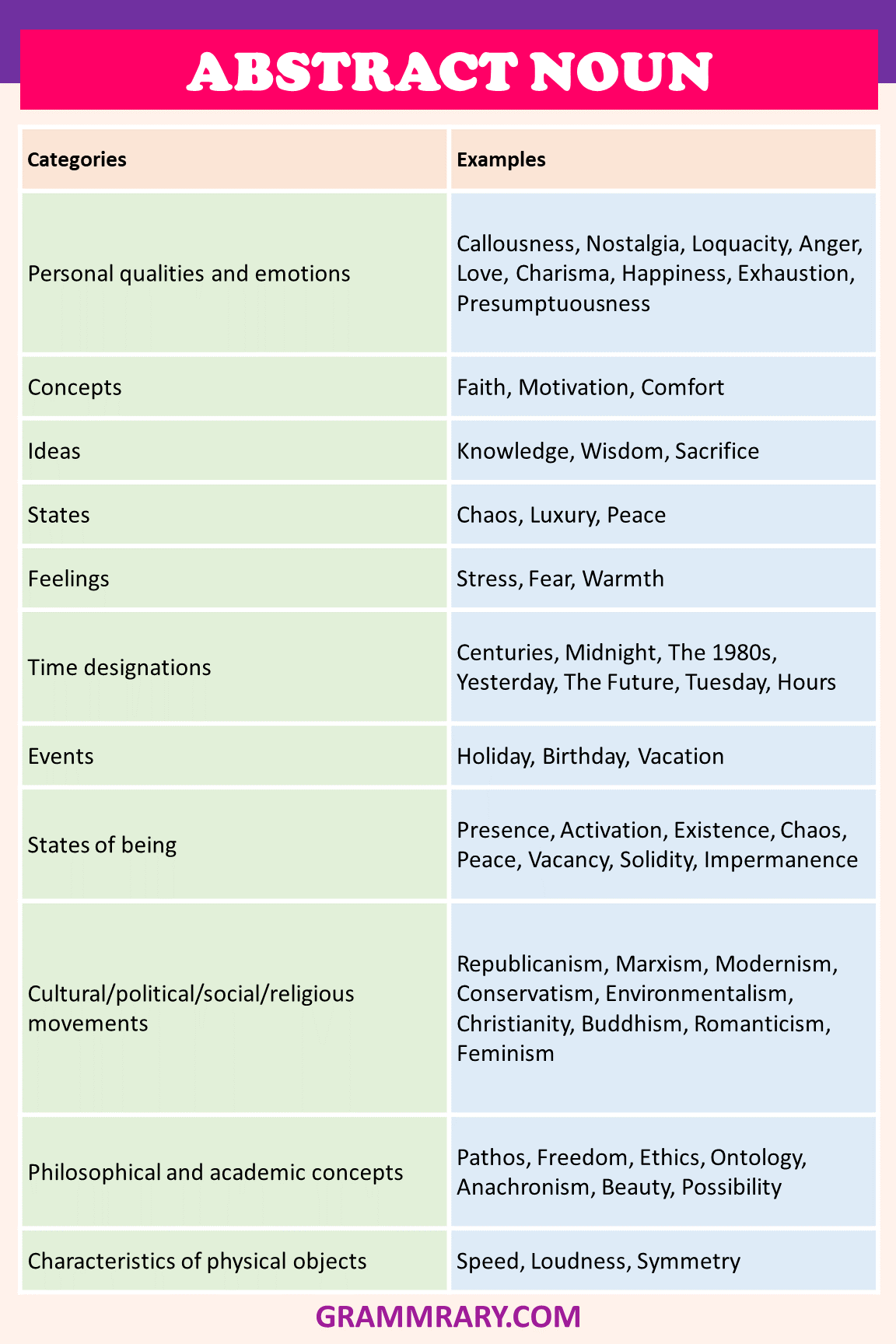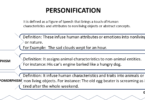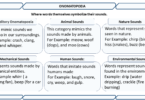What is an Abstract Noun?
What about love, Hate or Emotions? Which kind of Nouns these are, that don’t have any physical presence? Abstract Noun! These refer to non-physical concepts or objects that we can’t perceive with our senses. For Example: Sadness, analysis, government, love, adulthood, etc. Abstract Nouns represent things you can’t see or touch like feelings or ideas. They don’t point to Physical Objects. In fact, they show deep aspects of life, like kindness, dreams, or freedom.
Abstract Noun Definition:
It is the type of Noun that demonstrates the idea, quality, or concept, instead of any physical object. Here are Examples:
- Glory
- Courage
- Love
- Truth
- Honesty
- Reflection
Abstract Noun Examples:
| Categories | Types Examples |
|---|---|
| Personal qualities and emotions | Callousness, Nostalgia, Loquacity, Anger, Love, Charisma, Happiness, Exhaustion, Presumptuousness |
| Concepts | Faith, Motivation, Comfort |
| Ideas | Knowledge, Wisdom, Sacrifice |
| States | Chaos, Luxury, Peace |
| Feelings | Stress, Fear, Warmth |
| Time designations | Centuries, Midnight, The 1980s, Yesterday, The Future, Tuesday, Hours |
| Events | Holiday, Birthday, Vacation |
| States of being | Presence, Activation, Existence, Chaos, Peace, Vacancy, Solidity, Impermanence |
| Cultural/political/social/religious movements | Republicanism, Marxism, Modernism, Conservatism, Environmentalism, Christianity, Buddhism, Romanticism, Feminism |
| Philosophical and academic concepts | Pathos, Freedom, Ethics, Ontology, Anachronism, Beauty, Possibility |
| Characteristics of physical objects | Speed, Loudness, Symmetry |
Categories of Abstract Noun:
Here are categories of Abstract Nouns based on the concepts they represent.
- Qualities and Characteristics
- Emotions and Feelings
- States and Conditions
- Nature and Environment
- Communication and Expression
- Concepts and Ideas
- Time and Occasions
- Actions and Processes
| Category | Examples |
| Qualities and Characteristics |
|
| Emotions and Feelings |
|
| Power and Influence: |
|
| States and Conditions |
|
| Quantity and Measurement Concepts |
|
| Nature and Environment |
|
| Communication and Expression |
|
| Concepts and Ideas |
|
| Time and Occasions |
|
| Actions and Processes |
|
Abstract Noun Examples:
- I appreciate the love in our family.
- His wisdom and experience are priceless.
- The painting captured the profound beauty of nature.
- Patience and Hard work are the keys to success.
- The nuanced power of a heartfelt apology can heal relationships.
Formation of abstract noun:
Not all Abstract Nouns follow the specific patterns in terms of the suffixes they end with (e.g., “-ness,” “-ism”). But most of them follow.
There are several ways for the formation of Abstract Nouns. Abstract Nouns are formed from adjectives, verbs, and nouns in the following ways.
| Root words | + | Suffix | Abstract nouns |
|---|---|---|---|
| Appear, Resist, Perform, Ally | + | -ance | Appearance, Resistance, Performance, Alliance |
| Recite, Deny, Propose, Bestow | + | -al | Recital, Denial, Proposal, Bestowal |
| Relax, Flirt, Color, Realize | + | -ation | Relaxation, Flirtation, Coloration, Realization |
| Subsist, Exist, Depend, Refer | + | -ence | Subsistence, Existence, Dependence, Reference |
| Indicate, Relate, Hydrate, Equate | + | -ion | Indication, Relation, Hydration, Equation |
| Nation, Child, Mother, False | + | -hood | Nationhood, Childhood, Motherhood, Falsehood |
| Parallel, Liberal, Lyric, Critic | + | -ism | Parallelism, Liberalism, Lyricism, Criticism |
| Judge, Amaze, Base, Pave | + | -ment | Judgment, Amazement, Basement, Pavement |
| Christian, Generous, Dense, Historic | + | -ity | Christianity, Generosity, Density, Historicity |
| Owner, Friend, Fellow, Reader | + | -ship | Ownership, Friendship, Fellowship, Readership |
| Petty, Sad, Dark, One | + | -ness | Pettiness, Sadness, Darkness, Oneness |
Converting Verbs and Adjectives & other Nouns into Abstract Nouns:
The Verbs, Adjectives, and other Nouns can be transformed into abstract nouns by adding suffixes and vice versa. Here are some examples:
Converting Verbs to Abstract Nouns:
| Verbs | Abstract Nouns |
| Move | Movement |
| Reflect | Reflection |
| Perceive | Perception |
| Conscious | Consciousness |
| Appear | Appearance |
| Resist | Resistance |
| Appoint | Appointment |
| Enjoy | Enjoyment |
| Assign | Assignment |
| Inform | Information |
| Decide | Decision |
| Describe | Description |
| Determine | Determination |
| Block | Blockade |
Converting Adjectives to Abstract Nouns:
| Adjectives | Abstract Nouns |
| Brave | Bravery |
| Truth | Truthful |
| Honest | Honesty |
| Weak | Weakness |
| Happy | Happiness |
| Sad | Sadness |
| Mad | Madness |
| Responsible | Responsibility |
| Possible | Possibility |
| Probable | Probability |
| Able | Ability |
| Independent | Independence |
| Free | Freedom |
| Silent | Silence |
Common Nouns into Abstract Nouns:
| Common nouns | Abstract Nouns |
| Slave | Slavery |
| Friend | Friendship |
| leader | leadership |
| Owner | Ownership |
| scholar | scholarship |
| brother | brotherhood |
| Child | Childhood |
| True | Truth |
| friend | friendship |
| member | membership |
| Infant | Infancy |
Words That Function as Both, Nouns and Verbs:
Here are some examples:
| Words | Use as a Noun | Use as a verb |
| Love | Love is one of the qualities everyone should possess | I love the way she works with it. |
| Divorce | Are you getting a divorce? | Harry cannot divorce his wife. |
| Battle | Do you know who won the battle? | Teena had to battle hard to stay in shape. |
| Aim | What is your aim? | You have to aim for the highest grades. |

Abstract Nouns with Definition, categories and, and Examples







